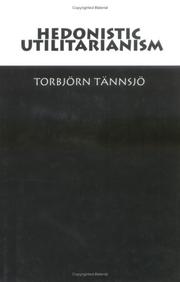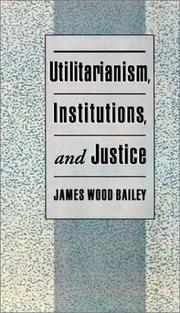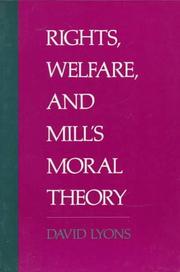| Listing 1 - 10 of 178 | << page >> |
Sort by
|

ISBN: 1317493397 1317493400 1315711923 1282943383 9786612943386 1844653900 9781315711928 9781317493389 9781317493396 9781844650897 9781844650903 9781317493402 9781282943384 6612943386 9781844653904 Year: 2007 Publisher: Durham : Acumen Publishing,
Abstract | Keywords | Export | Availability | Bookmark
 Loading...
Loading...Choose an application
- Reference Manager
- EndNote
- RefWorks (Direct export to RefWorks)
Utilitarianism a philosophy based on the principle of the greatest happiness for the greatest number of people has been hugely influential over the past two centuries. Beyond ethics, utilitarian assumptions and arguments abound in modern economic and political life, especially in public policy. An understanding of utilitarianism is indeed essential to any understanding of contemporary society. Understanding Utilitarianism presents utilitarianism very much as a living tradition. The book begins with a summary of the classical utilitarianism of the eighteenth and nineteenth centuries while subsequent chapters trace the development of the central themes of utilitarian thought over the twentieth century. Questions covered include: What is happiness? Is happiness the only valuable thing? Is utilitarianism about acts or rules or institutions? Is utilitarianism unjust, or implausibly demanding, or impractical? Where might utilitarianism go in the future?
Utilitarianism. --- Ethics --- Hedonism --- Philosophy
Book
ISBN: 1350021695 1350021679 1350021687 9781350021686 9781350021693 9781350021679 9780826429896 0826429890 9781350021662 1350021660 Year: 2017 Publisher: London : Bloomsbury Academic,
Abstract | Keywords | Export | Availability | Bookmark
 Loading...
Loading...Choose an application
- Reference Manager
- EndNote
- RefWorks (Direct export to RefWorks)
"The idea of utility as a value, goal or principle in political, moral and economic life has a long and rich history. Now available in paperback, The Bloomsbury Encyclopedia of Utilitarianism captures the complex history and the multi-faceted character of utilitarianism, making it the first work of its kind to bring together all the various aspects of the tradition for comparative study. With more than 200 entries on the authors and texts recognised as having built the tradition of utilitarian thinking, it covers issues and critics that have arisen at every stage. There are entries on Plato, Epicurus, and Confucius and progenitors of the theory like John Gay and David Hume, together with political economists, legal scholars, historians and commentators. Cross-referenced throughout, each entry consists of an explanation of the topic, a bibliography of works and suggestions for further reading. Providing fresh juxtapositions of issues and arguments in utilitarian studies and written by a team of respected scholars, The Bloomsbury Encyclopedia of Utilitarianism is an authoritative and valuable resource."--Bloomsbury Publishing.
Utilitarianism --- Ethics --- Hedonism --- Philosophy --- Utilitarisme
Book
Year: 2022 Publisher: Berlin : De Gruyter,
Abstract | Keywords | Export | Availability | Bookmark
 Loading...
Loading...Choose an application
- Reference Manager
- EndNote
- RefWorks (Direct export to RefWorks)
"Many scholars have studied the dialogue between the Epicurean tradition and Pierre Gassendi. However, no one so far has ever attempted to conduct a full analysis of the latter's specific reception of Lucretius. The book attempts to show that Gassendi was the first to discuss almost the whole De rerum natura, as part of an ambitious project. He sought to provide a Christianized version of Lucretius' theory or to develop an atomistic worldview "freed" from the many dangerous errors that were often imputed to atomism (impiety, debauchery, and irrationality). In particular, Gassendi developed a dialectical strategy that led him to recover a providential atomism, an Epicurean psychology that saves the immortality of the soul, and a Christian hedonism from the De rerum natura. The last goal was especially important. Gassendi here emerges as the culmination of a tradition of Christian philosophers, like Lorenzo Valla and Erasmus of Rotterdam, who have tried to merge Epicurean hedonism with the Christian religion. The volume could therefore attract both scholars of Antiquity and Renaissance/modern philosophy. It is also a rewarding reading for scholars of the reception of Latin poetry from a philosophical perspective."
Hedonism --- Atomism --- Religious aspects --- Christianity.

ISBN: 1474473059 1474400361 0585070016 9780585070018 9781474473057 0748610421 9780748610426 0748610421 9781474400367 Year: 1998 Publisher: Edinburgh Edinburgh University Press
Abstract | Keywords | Export | Availability | Bookmark
 Loading...
Loading...Choose an application
- Reference Manager
- EndNote
- RefWorks (Direct export to RefWorks)
GBS_insertPreviewButtonPopup('ISBN:9780748610426');This volume presents a comprehensive statement in defense of the doctrine known as classical, hedonistic utilitarianism. It is presented as a viable alternative in the search for a moral theory and the claim is defended that we need such a theory. The book offers a distinctive approach and some quite controversial conclusions. Torbjörn Tännsjö challenges the assumption that hedonistic utilitarianism is at variance with common sense morality particularly as viewed through the perspective of the modern feminist moral critique.About the AuthorTorbjörn Tännsjö is Kristian Claëson Professor of Practical Philosophy at Stockholm University.More books by Torbjorn Tannsjo."
Utilitarianism. --- Hedonism. --- Eudemonism --- Asceticism --- Ethics --- Philosophy --- Cyrenaics (Greek philosophy) --- Pleasure --- Utilitarianism --- Hedonism

ISBN: 1280452714 0195355679 1602561249 0585203024 9780585203027 9781602561243 9780195105100 0195105109 9781280452710 0195105109 9780195355673 0197734375 Year: 1997 Publisher: New York, N.Y. Oxford University Press
Abstract | Keywords | Export | Availability | Bookmark
 Loading...
Loading...Choose an application
- Reference Manager
- EndNote
- RefWorks (Direct export to RefWorks)
This text advances utilitarianism as the basis for a viable public philosophy, rebutting charges that, as moral doctrine, utilitarian thought permits cruel acts, justifies unfair distribution of wealth, and demands too much of moral agents. The author defends utilitarianism using game theory.
Utilitarianism. --- Institutions (Philosophy) --- Justice (Philosophy) --- Philosophy --- Ethics --- Hedonism --- Utilitarianism
Book
ISBN: 1139905090 1139914804 113989918X 1139903128 1107325374 1139907018 1139918729 1139910876 1139922610 9781139922616 9781107325371 9781139907019 9781107042254 1107042259 9781107674301 1107674301 Year: 2014 Publisher: New York
Abstract | Keywords | Export | Availability | Bookmark
 Loading...
Loading...Choose an application
- Reference Manager
- EndNote
- RefWorks (Direct export to RefWorks)
This collection represents the latest research from leading scholars whose work has helped to frame our understanding of Bentham since the publication of H. L. A. Hart's Essays on Bentham. The authors explore fundamental areas of Bentham's thought, including the relationship between the rule of law and public opinion; law and popular prejudices or manipulated tastes; Bentham's methodology versus Hart's; sovereignty and codification; and the language of natural rights. Drawing on original manuscripts and volumes in The Collected Works of Jeremy Bentham, the chapters combine philosophical and historical approaches and offer new and more faithful interpretations of Bentham's legal philosophy and its development. As a coherent whole, the book challenges the dominant understandings of Bentham among legal philosophers and rescues him from some famous mischaracterizations.
Law --- Utilitarianism. --- Ethics --- Hedonism --- Philosophy --- Jurisprudence --- Philosophy. --- Bentham, Jeremy,
Book
ISBN: 1316255344 1316234533 1316236420 1316253449 1316249662 1316251551 1107624657 1107110610 1316247767 1107046653 131624587X 9781316247761 9781107110618 9781107624658 9781107046658 9781316251553 9781107624658 Year: 2015 Publisher: Cambridge, United Kingdom
Abstract | Keywords | Export | Availability | Bookmark
 Loading...
Loading...Choose an application
- Reference Manager
- EndNote
- RefWorks (Direct export to RefWorks)
Plato often rejects hedonism, but in the Protagoras, Plato's Socrates seems to endorse hedonism. In this book, J. Clerk Shaw removes this apparent tension by arguing that the Protagoras as a whole actually reflects Plato's anti-hedonism. He shows that Plato places hedonism at the core of a complex of popular mistakes about value and especially about virtue: that injustice can be prudent, that wisdom is weak, that courage is the capacity to persevere through fear, and that virtue cannot be taught. The masses reproduce this system of values through shame and fear of punishment. The Protagoras and other dialogues depict sophists and orators who have internalized popular morality through shame, but who are also ashamed to state their views openly. Shaw's reading not only reconciles the Protagoras with Plato's other dialogues, but harmonizes it with them and even illuminates Plato's wider anti-hedonism.
Hedonism. --- Philosophy. --- Plato. -- Protagoras. --- Hedonism --- Philosophy & Religion --- Philosophy --- Eudemonism --- Asceticism --- Ethics --- Cyrenaics (Greek philosophy) --- Pleasure --- Utilitarianism --- Plato.
Book
ISBN: 9780674239241 0674239245 9780674239258 0674239253 9780674737372 0674737377 Year: 2019 Publisher: Cambridge, MA
Abstract | Keywords | Export | Availability | Bookmark
 Loading...
Loading...Choose an application
- Reference Manager
- EndNote
- RefWorks (Direct export to RefWorks)
We live in an age of addiction, from compulsive gaming and shopping to binge eating and opioid abuse. What can we do to resist temptations that insidiously and deliberately rewire our brains? Nothing, David Courtwright says, unless we understand the global enterprises whose "limbic capitalism" creates and caters to our bad habits.--Provided by publisher
Compulsive behavior --- Capitalism --- Hedonism --- Advertising --- Psychology, Pathological --- Psychological aspects --- Moral and ethical aspects --- Compulsive behavior. --- Hedonism. --- Psychology, Pathological. --- Psychological aspects. --- Moral and ethical aspects.
Book
ISBN: 0585346925 1280427965 0198024134 0195346769 142378507X 9780198024132 0197730949 Year: 2023 Publisher: Oxford : Oxford University Press,
Abstract | Keywords | Export | Availability | Bookmark
 Loading...
Loading...Choose an application
- Reference Manager
- EndNote
- RefWorks (Direct export to RefWorks)
Murphy argues that the problem with utilitarianism is not that it requires too much sacrifice, but rather in our nonideal world of partial compliance it unfairly requires those who do comply to shoulder the shares of the noncompliers as well.
Benevolence. --- Social ethics. --- Utilitarianism. --- Ethics --- Hedonism --- Philosophy --- Social problems --- Sociology --- Conduct of life

ISBN: 1280526777 0195359631 1429405716 9781429405713 9781280526770 9780195082173 0195082176 0195082184 9780195082180 0195082176 0197731570 Year: 1994 Publisher: New York (N.Y.): Oxford university press
Abstract | Keywords | Export | Availability | Bookmark
 Loading...
Loading...Choose an application
- Reference Manager
- EndNote
- RefWorks (Direct export to RefWorks)
This volume collects David Lyons's essays on Mill's moral theory and includes an introduction which relates the essays to prior and subsequent philosophical developments. The essays defend the beneficiary theory of rights and develop new interpretations of Mill's moral thought.
Ethics, Modern --- Utilitarianism. --- Ethics --- Hedonism --- Philosophy --- Mill, John Stuart, --- 穆勒 --- Utilitarianism
| Listing 1 - 10 of 178 | << page >> |
Sort by
|

 Search
Search Feedback
Feedback About UniCat
About UniCat  Help
Help News
News